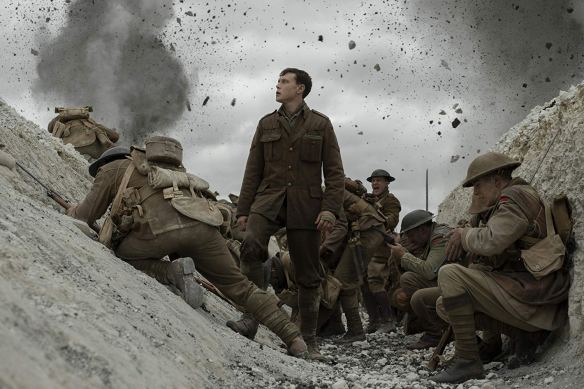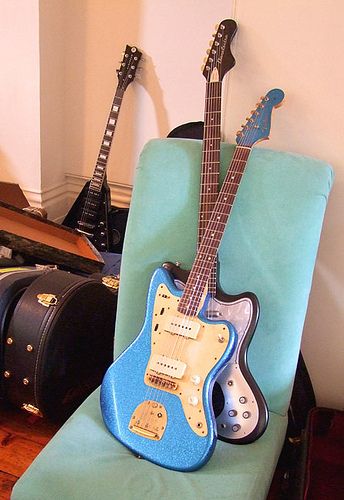Not many people know this, but I was actually the sixth Beatle!
I’d known Paul for years. We’d hung around the streets of Liverpool trying to pick up birds. It was hard work, as some of those girls were really heavy. Anyway, when it came time for the boys to record their second album (at this stage it was going to be called “The Beatles Wow”), Paul called me up to see if I could bring along any cakes or sandwiches, as he knew my Mum was the best cook in the street.
So, I went along to the session at Abbey Road with a few biscuits and a big chocolate cake, and George Martin flew into a rage. “Is this all you could come up with? Some biscuits and a silly cake?” He really was a greedy, bad-tempered bastard, and after complaining all morning, ate as much of the cake as he could during the break. I bought him a couple of extra doughnuts, which seemed to calm him down, and he ended up letting me add some handclaps to “I Wanna Be Your Man”.
Years later, I went along to the “Sergeant Pepper” sessions, but that’s a whole other story. George Martin spent more time sleeping then eating in those sessions.
But I’m getting a little ahead of myself, because my first contact with the music scene was when I got to know Bobby Zimmerman. I’d just finished my Kerouac phase, after hitch-hiking from Chicago to Los Angeles. On the way back to the East Coast I found myself at the University of Minnesota. I bumped into Bobby pretty soon – everyone seemed to know him. He was always trying to come up with a new angle on how to be a pop star. I suggested the surname ‘Dylan’ – he wanted to go with ‘Dolly’ or ‘Dolphin’, which didn’t quite have the same feel. Then there were the instruments themselves. Bobby was trying to play the guitar and the trumpet at the same time. I told him it wouldn’t work, but he was a pretty stubborn guy. Months later, he tried out the harmonica, and things started to fall into place. I went with him to New York in ’61, but he soon left me behind once his career started to take off.
There was one night just before we separated, both of us high on weed, and Bobby dragged his guitar out and began strumming a few random chords. I was singing along, and, as it’d been a wild, wintry day, and kept repeating the phrase “Blowin’ in the wind”. Now I wouldn’t begin to take credit for the song, but imagine my surprise when it was a big hit. I think I was living under the tram line in Brooklyn at the time.
I hung around Greenwich Village and the protest scene for a couple of years, but soon grew bored when singers began protesting about the colour of cardigans and the inability of whales to speak Greek.
I went to England in mid-63, and as I’ve already explained, helped The Beatles with their second album. I’d just finished with them, when Mick and Keith from The Stones called me up. They’d heard about my Mum’s cakes and biscuits and wanted a taste while recording their new album “Afterdinner” (later known as “Aftermath”). Unfortunately, I was with them during the “peeing incident”. We were on our way back from Brighton, when Keith and the lads decided to stop for a piss. We all got out of the limousine and each found our own private hedge. But Keith was in a mischievous mood and began peeing all over Mick and Bill, then he pulled the cakes out of the car and peed on them. As you can imagine I was very annoyed.
The police arrived in the middle of all this and arrested everyone on ‘public indecency’. After the original cakes got peed on, I refused to arrange more, even though Mick begged me. “Those cakes and cookies could mean the difference between a hit and a flop.” I refused, and apparently Mick and Keith were so angry they wrote “Sympathy for the Devil” about the incident. Originally, the song had references to cream buns and marzipan.
I didn’t speak to Mick or Keith for years after that, in fact, things were so dull in London that I went back to New York, and caught up with Andy Warhol. He was stuck on an idea for his next project, so I suggested he photocopy baked bean cans. He really wasn’t keen on the idea and had this whole dog thing planned. But after an Afghan Hound tore up The Factory and peed on Twiggy, he reconsidered the baked bean idea.
It wasn’t long before The Factory became the New York ‘scene’ attracting poets, pop stars, pirates, and parakeets. Andy, Gerald and I went to this club one night and saw this crazy band that called themselves The Velvet Underground. They made me want to throw up, but Andy was somehow fascinated with them. Pretty soon, they were hanging around at The Factory too. And they practised every day, not that all the band were that enthusiastic. John, Moe and Sterling couldn’t give a shit. Nico was nowhere to be seen. Only Lou was dedicated, strumming away to his strange lyrics about toothpaste, parachutes, and coconuts.
When Andy did get them booked, it was often my job to make sure they all got to the venue on time. John Cale didn’t believe in time, having destroyed all his clocks. Moe was too busy bashing her toms to hear us calling her. Sterling hated the band and would deliberately bring the wrong instrument – a bassoon, bagpipes, a mouth organ. Nico had to be literally walked to her spot on the stage, which we marked with an “N” in chalk. She still didn’t get it right, and would often wander off stage as though visiting the powder room.
Whenever this happened, Andy got me up on stage with my kazoo or spoons. I didn’t get to play on any of the Velvet’s albums, but I did help Lou with some of the lyrics. “Waiting for the Man”, for example, used to be called “Waiting for the Mandarin”. And “Heroin” was originally called “Hairy Woman”.
By the late 60’s I was getting tired of life at The Factory – too many hangers-on, nobodies, cheesy celebrities. I did get to meet Jim Morrison though. We became good friends for a while. He even leant me a pair of his leather underpants. I was to blame for the strings on “The Soft Parade”, which pissed everyone off for months.
I was in the bath with Jim when he passed away. It wasn’t drink or drugs, but a dangerous bath toy.
I left Paris straight after the funeral and found myself in London for the first time in 8 years. It wasn’t long before Davie Jones (or Bowie as he now called himself) called up. He was after ideas for a new stage show. He’d heard about my Mum’s cooking from Lennon, and was thinking of an entire evening of dancing baked goods. I suggested that the cakes and cookies could have been brought to life by an alien ray. David changed the central character’s name from Sprinkle Fairydust to Ziggy Stardust, and all of a sudden, his imagination caught fire. By the following morning, we’d written a couple of songs, designed the stage set and a couple of costumes. We celebrated by snorting an entire bag of ‘green’ coke. Something special David had acquired in South America.
As you would know “Ziggy Stardust” was a huge hit. As payment for my contribution, David arranged for several bags of the ‘green’ coke, which was fine until I discovered that the green tinge was a result of a type of mould.
Anyway, things were moving on in the music scene. A new sound calling itself ‘punk’ was suddenly popular. I was in Manchester at the same time as punk’s premiere band The Sex Pistols. They were playing at the Lesser Free Trade Hall. It’s been said that everyone who was anyone was at that first gig, but I can only recall seeing a young Morrissey and Mick Hucknall. The Hall was only about half full.
The band itself generated a great deal of energy, most which emanated from the ‘singer’ Johnny Rotten, whose main act of aggression involved spitting great globs of spittle at the front rows.
When the Pistols returned a few weeks later, the Hall was packed. I saw Tony Wilson, Peter Saville, Howard Devoto, the Warsaw boys. I’d met Steve and Bernard a few weeks earlier at a local fish and chippery. They were troubled over Ian’s ideas for a new band name. Ian wanted to call the band either Toy Division or Joy Sauce. When I suggested a compromise by adding Joy to Division, the boys seemed relieved. But when they approached Ian, the difficult front-man decided he liked Toy Sauce best of all…
When I saw them a year later, they were still bickering about the name. Ian is supposed to have said he wanted Fluffy Pop Twinkles “or else”. Some have even suggested that the name issue might have pushed Ian over the edge.
I moved back to London after that, and began thinking of my own band. A new variation on punk was taking over the scene – some called it post-punk – and I decided I wanted to be part of it.
END OF PART ONE








